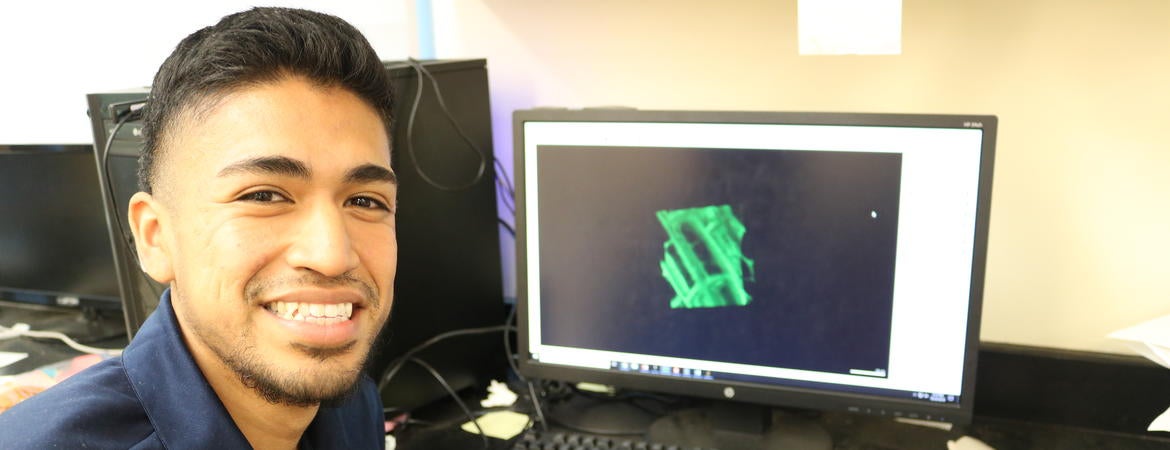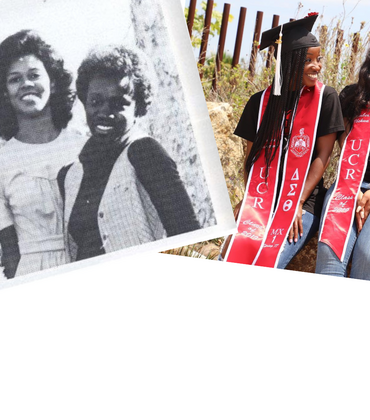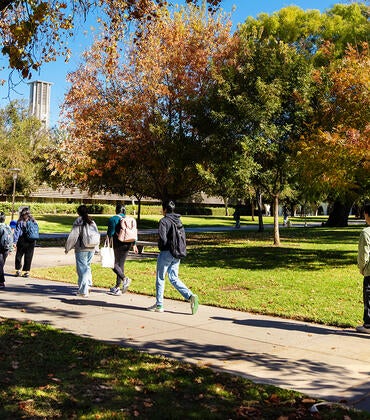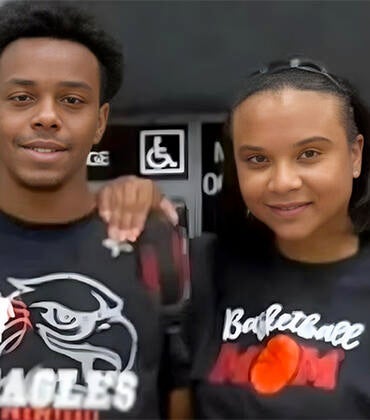
The bedroom he shared with his parents and three siblings included a bunk bed, a queen bed, two wardrobes, and a narrow wooden table that served as his desk.
That bedroom was where Alejandro Quiñones lived through middle school and high school with his family. Quiñones, 21, now a senior biology and pre-med major at UC Riverside, focused on school – and sometimes on working alongside his mother, who loved tending her potted garden, lined with peace lilies, crown of thorns, cacti, and herbs. In essence, she became his first biology teacher.
Quiñones is the first in his immediate family to attend college. He’s now working toward a new goal: medical school.
“We were six people in one room, so we just made it work. I never saw our living condition as something out of the normal, but coming to UCR made me see the world through a different lens,” said Quiñones, his laptop screen displaying the mathematical modeling he uses to analyze cell division in corn. He’s conducting this research for Carolyn Rasmussen, UCR assistant professor of plant cell biology and head of the Rasmussen Lab.
After his parents lost their home, they moved into an aunt’s house in Lynwood, a city south of Los Angeles. When it was time for homework in the evenings, he’d pull up a chair and sit behind the 3-foot-by-2-foot desk that also served as an ironing board.
By the time he was in high school, his mother had him apply and test into the California Academy of Mathematics and Science in Carson, where his two younger siblings also attended. Every day, Quiñones carpooled about 20 minutes from Lynwood to Carson with his friend’s parents. Among other courses, Quiñones was taking Advanced Placement calculus, English, Spanish, engineering, and biotechnology.
In the past three years, Quiñones has completed several summer research programs, and has worked at a handful of labs while volunteering in different capacities through the Inland Empire.
In summer of 2017, Quiñones boarded an airplane for the first time – it was also his first trip out of California – to Maryland for a 10-week research fellowship with the United States Department of Agriculture, or USDA. There, lab work involved young swine and answering questions about the composition of bacteria in the animal’s small intestine. A few months ago, the USDA’s lead researcher, who supervised Quiñones, published the findings and gave him his first contributing author credit.
Alex Cortez, academic coordinator for UCR’s Dynamic Genome Program, worked with Quiñones for two years and describes him as “humble, intelligent, and selfless.”
Cortez said Quiñones’ first team poster presentation on proposed solutions for strawberry production in California included a special guest in the audience: Esperanza Quiñones Baltazar.
“His mother, full of pride by her son’s accomplishments, told me in Spanish how the nature of his project’s plant research resonated with the family’s agricultural roots in Mexico,” Cortez said, recalling the 2016 presentation.
Most recently, Quiñones spent 10 weeks at Harvard Medical School through the Howard Hughes Medical Institute’s Exceptional Research Opportunities Program fellowship, also known as HHMI EXROP. At Harvard, he worked with a graduate student and looked at a drug designed to treat inflammatory bowel disease. Quiñones also looked at the chemistry of the drug and how enzymes react to it.
“It was eye-opening. There were experts from around the world, many Latinos. I met scientists and medical professionals from Puerto Rico, Venezuela, Spain. Speaking about science in Spanish was awesome. It was an amazing experience. It really motivated me,” Quiñones said.
While he balances a full course load at UCR, Quiñones has found additional ways to gain hands-on experience. He volunteers at the Riverside Free Clinic and the San Bernardino Free Clinic. The clinics provide free health services to indigent residents in the Inland Empire. Quiñones’ job is to help UCR medical students by serving as translator and triage assistant. His Spanish-language skills tend to break the ice with Latino patients, he said.
On campus, Quiñones is also a Chicano Link Peer mentor, is part of the Latino Medical Student Association, and is a Health Professions Advising Center ambassador. These organizations support undergraduates with mentorship. Several Saturdays a month, he visits senior living homes through the Young At Heart program, of which Quiñones serves as president.
In her lab, Quiñones shows he is bright and ambitious, Rasmussen said. Currently, he is working to understand how plant cell shape contributes to cell division, using a mathematical modeling approach developed in her lab.
“I anticipate that his work will likely contribute significantly enough to co-author a manuscript, which is rare for an undergraduate scientist,” Rasmussen said.
Coming to the UCR campus that first summer in 2015 through FastStart, a UCR School of Medicine pipeline program, set the tone for what has been an unforgettable experience.
“I had my own bed, my own closet. That was the first time I had slept on my very own bed, something I had never even contemplated as a possibility,” Quiñones said. “Instead of going out that night, I called my brother and told him ‘I have my own bed!’”



